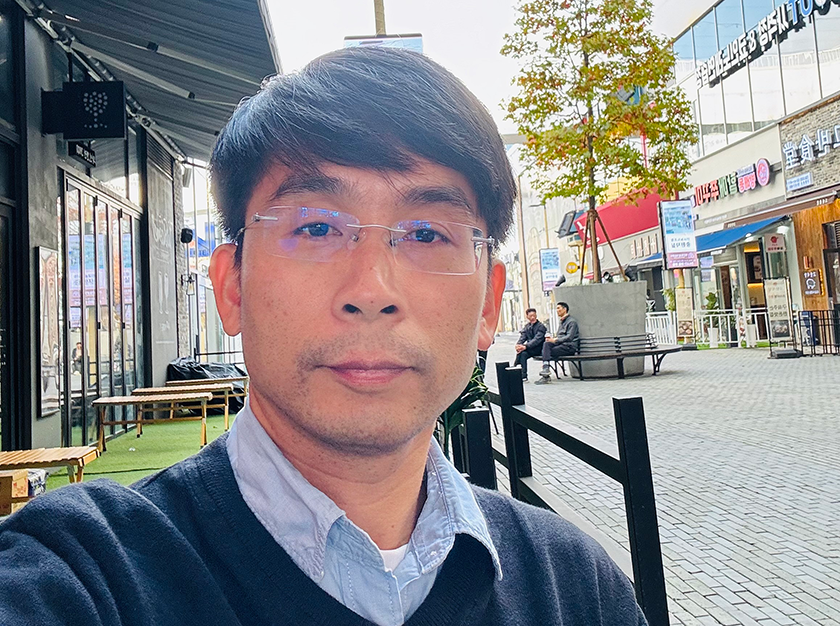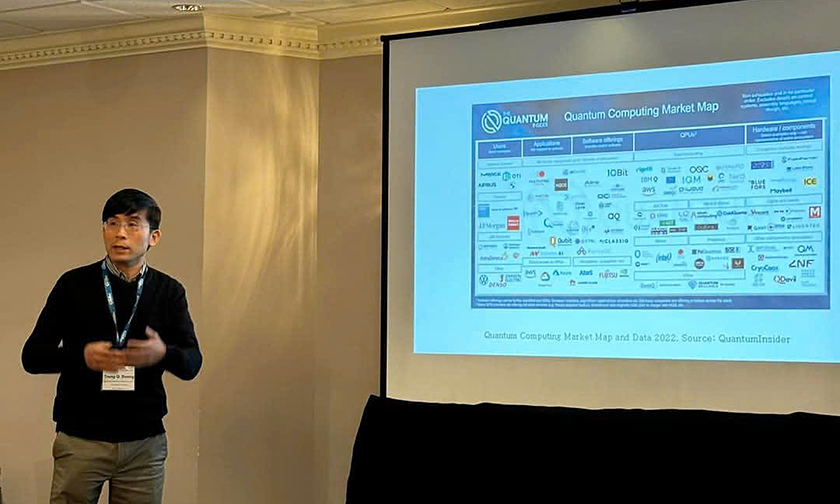Prof. Dr Duong Quang Trung is currently a lecturer and researcher at Queen’s University Belfast. Eager to contribute to scientific research in Vietnam and to share knowledge with students, he now and then takes time off his work in the UK for trips back to Vietnam to offer his expertise as a scientist.
In Vietnam, Prof. Dr Duong Quang Trung has been closely associated with DTU, where he has personally taught classes to students of Information Technology and of Electric Engineering, and he has organized many meaningful and highly regarded international conferences, such as the International Conference on Computing, Management, and Telecommunications (ComManTel) and the International Summer Research School.
Prof. Trung currently serves as editor-in-chief of the journal EAI Endorsed Transactions on Industrial Networks & Intelligent Systems, with DTU Provost Dr Le Nguyen Bao a co-editor-in-chief. This journal is sponsored and published by DTU and the European Alliance for Innovation (EAI), an organization with 90 thousand members from 167 countries.
Most recently, VnExpress published the article “From Tin-Can Phone to World-Leading Expert on 6G”, highlighting Prof. Trung’s journey of learning, work, and success in the field to which he dedicated so many years.
A “telephone” made from empty tin cans, which he played with with his friends during stormy days, gave Prof. Trung his first taste of telecommunications - and twenty years later he became a leading scientist in 6G networks.
At 45 years, Mr Trung is a professor at Memorial University of Newfoundland, Canada. Earlier this year, he became the first Vietnamese editor-in-chief of the journal IEEE Communications Surveys & Tutorials (IEEE COMST). This is the top journal among the 336 journals published by the IEEE, the world’s largest professional technical organization.
Stanford University (US) and the Scopus database (a reputable database from Dutch publisher Elsevier) put Prof. Trung among the most influential scientists in wireless communications and signal processing.
Currently, he and his colleagues mainly focus on research in artificial intelligence and computing, machine learning, and quantum optimization to develop communication technology and create unlimited mobile connections like 6G mobile networks.

Prof. Trung in South Korea in November 2024. Photo courtesy of Duong Quang Trung
Mr Trung is from Hoi An, Quang Nam province. He was consistently at the top of his class in primary school and in junior high, but when he sat the entrance exam for mathematics at a specialized senior high school in 1994, he did not pass.
“At that time, I cared more about play than about work and I didn’t practice any sample tests,” Mr Trung recalls. “I didn’t consider it a failure, but the experience motivated me to work harder when studying at Tran Quy Cap senior high.”
A turning point came when Mr Trung enrolled at the HCMC University of Technology in 1997. Although he was not yet sure about his future, he chose to study Electronics & Telecommunications, based on a childhood experience. Hoi An often floods whenever it rains for long periods, he explains. When they could not meet to play, he and his friends in the neighborhood would talk over tin-can phones.
“The ‘telephone’ made from empty milk cans and connecting strings gave me my first taste of the wonders of telecommunications,” Prof. Trung remembers.
At the HCMUT, he studied with Prof. Le Tien Thuong. The knowledge and teaching methods that Prof. Thuong acquired during his research abroad enlightened and inspired the then 18 or 19-year-old Trung, and it made him realize that he needed to step out into the world to continue learning.
While most of his friends started working right after graduation, Mr Trung diligently studied English, read academic materials, and prepared his application for overseas studies, because he felt that he was cut out for research. Despite the pressure of seeing his friends earn attractive incomes, he remained committed to his path, eventually winning full scholarships for a master’s degree and then a PhD in South Korea and Sweden.
In 2013, Mr Trung obtained tenure at Queen’s University Belfast, one of the 24 best universities in the UK. In August 2020, he was promoted to full professor, one of the fastest promotions in the nearly 200-year history of the university.
Mr Trung says that while in the past he could focus solely on research, he now has to balance many tasks: teaching, building a research team, management, and submitting grant proposals.
“There’s many things I never did as a PhD student. So far, I think this transition is one of the biggest challenges for postdoctoral researchers and those in the early stages of obtaining tenure,” Mr Trung reflects. “But pressure always comes with challenges and creates opportunities.”
Mr Trung went on to become the only person in the UK to receive two research awards from the Royal Academy of Engineering - in 2016 and 2020. He also won the Newton Prize from the UK government in 2017 for his research applications in disaster prevention.
Mr Trung and his colleagues furthermore secured about 40 million USD in research funding. In late 2023, he received 6 million USD to establish a strong research team after being appointed Canada Excellence Research Chair. For eight years, he and his team will work to solve challenges related to security, accuracy, and capacity in wireless and mobile devices, in the context of growing traffic.
At that time, Memorial University President Prof. Neil Bose noted that Prof. Trung was the first person at the university to receive this honor. Memorial University is strong in telecommunications and in information & communications technology (ICT), which represent strategic and critical areas of research for the institution.
“As an outstanding and skillful leader in his field, Prof. Duong Quang Trung’s visionary research will strengthen our growing international reputation as an innovative leader in advanced ICT,” was Professor Bose’s assessment.

Prof. Trung gave a keynote presentation at the IEEE RoboCom CCNC workshop in Las Vegas, US,
January 2025. Photo courtesy of Duong Quang Trung
Mr Trung says that his core principle when conducting research is to always think about the impact and influence of what you create. “I will do whatever is useful for society” is what he always keeps in mind.
Telecommunications and mobile information technology are constantly improving and are in wide use, which gives him a perpetual sense of novelty and joy in his work. According to him, mobile technology changes every ten years due to the evolving needs of society. Scientists like him began researching 6G about four or five years ago. The focus of 6G is not just on transmission speed, but also on latency, large numbers of users, reliability, and security.
"For example, latency approaching zero will allow 6G to be applied in many fields like autonomous vehicles, virtual reality, robotics, healthcare, and industrial automation,” Mr Trung says. “This is one of the challenges that we are working to improve and solve.”
Currently, his research team is working with leading companies worldwide such as Nokia Bell Labs and IBM to develop 6G technology using artificial intelligence and quantum computing, with the ambition to outperform 5G by ten to a hundred times in system performance metrics.
Mr Trung has additionally been working with DTU for many years to organize science summer camps in support of researchers and students. At these camps, he provides specialized knowledge and academic activities from advanced educational systems and he shares scholarship information and application experience. After six camps, about 80% of the more than a hundred students who attended have won scholarships abroad.
Mr Trung explains how he gets asked whether he has ever failed on his journey of learning and work.
“Looking at my resume, you might be mistaken into thinking my life is all success, but I have experienced failures as well,” he says. “What matters is what I learned and how I changed after each experience.”
Mr Trung believes that scientific research is not a path to fame or a tool for wealth. Research requires passion and effort, and those who pursue it must receive thorough, long-term training and avoid taking shortcuts.
(Media Center)